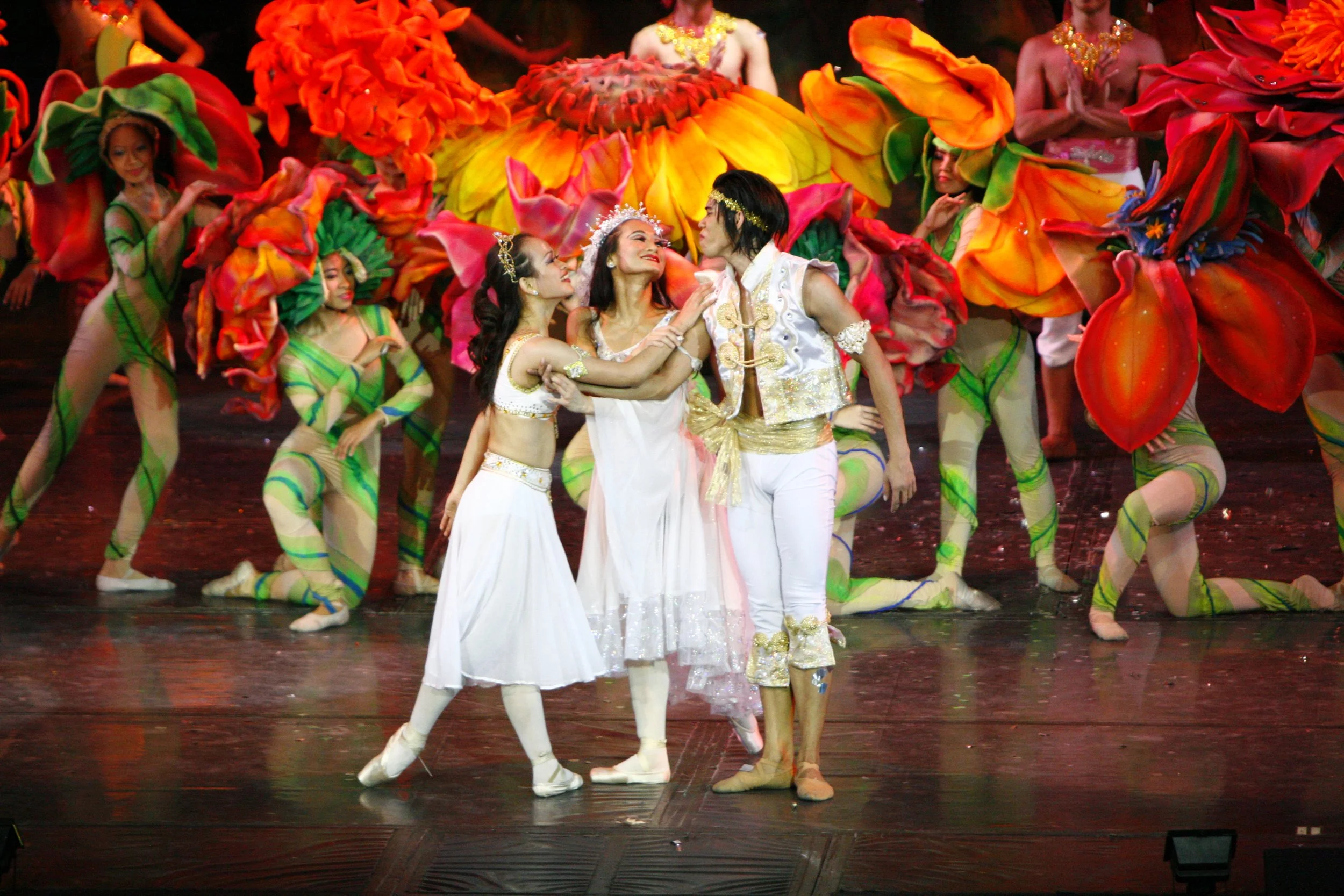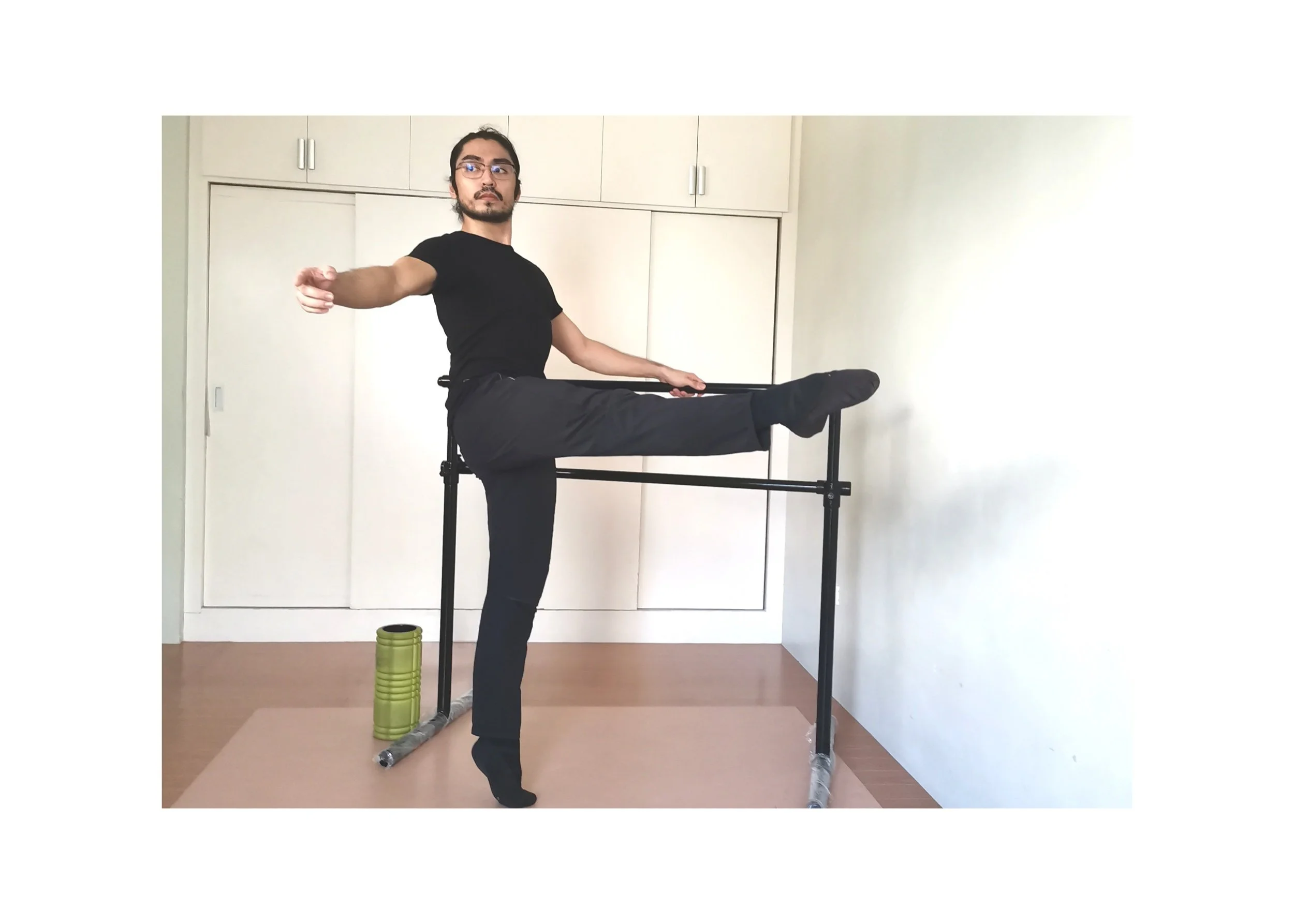Teacher Sofie’s passion for dance education continues, pandemic or not
At The Lisa Macuja School of Ballet’s Fishermall branch in May 2019, Teacher Sofie (back row, leftmost) poses with some of her students after their exams. Standing with her are Ballet Manila colleagues Jonathan Janolo, Abigail Oliveiro and Rudy De Dios. Photo courtesy of Sofia Sangco-Peralta
By Jv Ramos
To say that Sofia Sangco-Peralta’s days are so busy is an understatement. When she’s not preoccupied with being a mother to three boys and wife to Romeo Peralta, a principal dancer at Ballet Manila, she is so immersed in ballet education, wasting no time in training young dancers and expanding her knowledge about her profession even more.
Sofia Sangco-Peralta – “Teacher Sofie” to her students at The Lisa Macuja School of Ballet – has gotten the hang of teaching ballet online from home although she still underscores the importance of learning in the studio. Photo by Romeo Peralta
In fact, when the strict COVID-19 lockdown took place in 2020, “Teacher Sofie” chose to join online company classes when these were eventually offered to keep herself engaged in ballet; soon, she jumped into helping figure out how The Lisa Macuja School of Ballet could still continue its mission of teaching ballet without students having to go to the studios.
“Maraming bagay na kinailangan kong matutunan,” begins Teacher Sofie, who like most of us had to learn how to operate Zoom and how to translate everyday activities to the online platform. “Noong una, maliit lang ang screen na gamit, so mahirap makita ang ginagawa ng bawat estudyante. Buti na lang na binigyan kami ng unit ng kapatid ni Romeo.” (There were many things that I had to learn… At first, we were using a small screen for teaching, so it was difficult to see what each student was doing. It’s a good thing that Romeo’s brother gave us a spare unit to teach with.)
Recently promoted as Assistant of the Directress, this educator observes that as more months were spent learning from home, she and the other teachers were able to master the online platform more and more. “Nag-evolve na lang nang nag-evolve, katulad lang ng bahay namin (Things just evolved and evolved, much like our own home),” she enthusiastically expresses.
At first, the Peraltas had to improvise. Sofie would use the sliding door as her substitute barre while Romeo made do with a stack of chairs. Now, they have an actual barre. To make their floor comfortable for teaching and dancing, they installed Marley floor (vinyl) which they acquired by trading pointe shoes that she would no longer be using for it.
Sofie (foreground, leftmost in Swan Lake, 2005) is able to impart to her students what she herself learned and practiced as a dancer with Ballet Manila for two decades. Photo by Ocs Alvarez
Teacher Sofie also adds that she and Romeo even got rid of their bed frame to have more dancing space, using just a mattress which they can easily set aside when it’s time for work. Currently, their house has two makeshift dance studios that has made it easier for them to teach and dance.
Asked what the biggest adjustment for her was, Sofie notes that since she doesn’t have physical access to her students, she can’t simply adjust a body part when she corrects something as she used to immediately do in the studio. “Kailangan ma-describe mo ang correction nang malinaw, at i-explain kung bakit kailangan itong gawin. So in a way, mas na-improve ang vocabulary ko or ang paggamit talaga ng terms sa Vaganova method dahil kinailangan talagang maging mas communicative ka bilang teacher.” (It became necessary to describe each correction thoroughly, and to really explain why the student needs to execute it. In a way, online teaching improved my dance vocabulary or made me use more terms from the Vaganova method.)
Teacher Sofie underlines that having to identify and explain terms elaborately wasn’t so much of a difficulty, but rather it was another opportunity to expand her knowledge about ballet. “Kahit bago pa lang mag-pandemic, gusto ko nang mag-aral pa ng tungkol sa Vaganova method. Feeling ko kasi may kulang, so nang nagkaroon ng break dahil sa pandemic, talagang nag-Teachers Workshop kami, at doon na-refresh at nadagdagan pa ang kaalaman ko.” (Even before the pandemic, I felt the need to study more about the Vaganova method. I felt that something was lacking, so when the pandemic brought about a break from teaching, we had a Teachers Workshop, which refreshed and expanded my knowledge of the Vaganova method.)
Sofie performs the title role in Hazel Sabas-Gower’s Sinderela (2012) with husband Romeo Peralta as her Prince. Photo by Ocs Alvarez
Apart from honing her teaching skills, another opportunity that the pandemic brought was being able to reach students who aren’t based in Manila. The Lisa Macuja School of Ballet now has students from the likes of Cebu and Cagayan de Oro, as well as from Hong Kong, Malaysia, Indonesia, and Bahrain. “Na-notice ko na mas nag-improve o bumilis ang progress ng students. Tuloy-tuloy kasi ang ballet nila, at madaling sumali sa klase, mag-login lang ang kailangan nilang gawin. Wala na ang factors na pagiging late dahil sa traffic, pagiging masyadong malayo ng studio, o kaya pagtigil ng isang linggo dahil sa exam week.” (I noticed that the progress of the students improved or happened in a short period. That’s because their ballet lessons were continuous, and it became easy to participate in classes. All they had to do was login. Factors that hindered them from attending class also didn’t come into play, such as traffic, the location of the studio, or having to stop for an entire week due to exams.)
Of course, teaching ballet is more than helping students master technique and combinations; a big part of it is keeping students interested in the dance form. To achieve this, Sofie has always made sure that her corrections are paired with encouragement. For example, if a student is having trouble executing a correction, she’d acknowledge the effort and end with a motivating, “Let’s keep working on that!”
Teacher Sofie even states, “At nitong pandemic, naging goal ko talaga na tuwing tapos na ang klase, naka-smile pa rin dapat sila. Alam ko kasi na nasa bahay lang sila, walang magawa. Gusto ko na masaya sila at may feeling of accomplishment pagkatapos ng klase.” (During the pandemic, I made it my goal to end class with my students still smiling. I knew very well that most were just stuck at home, doing nothing. So I wanted them to end class feeling happy and that they’ve accomplished something.)
After their performance in Le Corsaire (2013), Sofie (right) and Tiffany Chiang-Janolo (left) are congratulated by Ballet Manila artistic director Lisa Macuja-Elizalde. Photo courtesy of Sofia Sangco-Peralta
Sofie was already drawn to teaching even as she was still actively dancing with Ballet Manila where she eventually became senior soloist. What pulled her into it was its positive effect on her own dancing “Kapag nagbibigay ka ng mga correction, nasasaulo mo ang mga ito at na-a-apply mo sa sarili mo, so nag-i-improve ka. Pero nu’ng nagtagal, natuwa ako doon sa idea na may inaalagaan ako, na nagiging part ako ng growth ng iba as a dancer. Malaking fulfillment ‘yon para sa akin! Passion ko talaga ang dance, at hindi lang ballet. Any kind of dance, gusto ko!” (When you give corrections, these stick and you’re able to apply these to your own dancing, so you improve. Eventually, teaching became more than that. I like the idea of nourishing, of being part of someone else’s growth as a professional dancer. That to me is a huge fulfillment. Dancing truly is my passion, and I don’t just mean ballet. I love any form of dance!)
A testament to Teacher Sofie’s passion for dance education was when she taught tap dancing to the kids in the compound they reside in during the pandemic. “Hindi pa masyadong busy sa school noon, kaya naisipan ko’ng turuan ang mga bata dito sa compound. Alam ko kasi na marami sa kanila ay walang ginagawa.” (Since the school wasn’t too busy yet, I thought of teaching the youth in our compound. I knew that many were just idle.)
The soft-spoken teacher notes that the effort was really to motivate her three sons Liam, Ethan and Stephen to continue their tap dancing, but the lessons went on for four months. Her sons and the kids in the compound finished an entire module, and they even had a recital to culminate their lessons! She confirms, “Naging passion ko na rin lang din ang teaching. Gusto ko kasi laging ma-spread ko ang passion ko sa sayaw.” (Soon, teaching became my passion too. Teaching sprang out of my desire to spread my passion for dance.)
Sofie – with husband Romeo and their kids Ethan, Liam and Stephen – enjoys a recent family outing that also marked her 40th birthday. Photo courtesy of Sofia Sangco-Peralta
So how have things been in the Peralta home for the past two years? Sofie answers that the work-from-home setup is a huge advantage. As soon as she’s able to log out of Zoom, she can immediately bond with her sons or help them with homeschool learning – the mode of education they’ve chosen to implement even before the lockdown. “Never naman sila nangulit na lumabas. Nakakasama naman nila ang mga ibang bata sa compound, at dahil tatlo sila, nagkakapag-bonding at nakakapaglaro sila nang sila-sila lang.” (They never bothered us about stepping out of the house since they were able to bond with other kids in the compound, and since there are three of them, they can also bond and play by themselves.)
Since both she and Romeo became simultaneously more involved with teaching during the pandemic, Sofie also notes many chances came up for the two of them to help each other out. “Walang clash ang nangyayari. Mas na-strengthen din ang relationship namin with God.” (We didn’t clash. Our relationship with God also became stronger.)
She continues, “Siguro nasa personality ko talaga na makita ang positive side of things, pero may mga kabutihan ding nangyari. Maraming opportunities na naibigay, kasama na ang more time with family.” (Maybe it’s also in my personality to focus on the positive side of things, but many good things did come out of the pandemic. Many opportunities were presented, which includes spending more time with family.)
In Albert Dimarucut’s Dulce, showcased in Ballet Manila’s Halo-Halo Supreme (2008), Sofie (center) was able to share her skills in ballet and ballroom dancing. Photo by Ocs Alvarez
Ever-appreciative but also meticulous about her job, Teacher Sofie shares that The Lisa Macuja School of Ballet, after eight online recitals, will eventually implement a hybrid method which would allow students to come to the studio and still continue learning even if their circumstances prevent them from doing so. “Nakita naman kasi natin na may advantages din ang online learning, pero importante pa rin ang learning sa studio. Kahit ako, minsan akala ko na okay na ang lahat, pero pagdating sa studio, may mga corrections pa pala. Mas ma-i-improve pa nila ang ballet nila.” (We’ve seen the advantages of online learning, but learning in the studio is also essential. I’ve experienced thinking that the student is executing all things correctly already. But upon stepping in the studio, I still find myself pointing out corrections. You can point out how the student can further improve.)
“Gusto kong maibigay ang best ko sa pagtuturo! Katulad lang ng pagbigay ko ng best ko sa dancing ko,” sums up Teacher Sofie. (I want to be able to give my best in teaching, the same way I did my best when I was dancing.)
Teacher Sofie – seen here taking company class in 2005 – finds fulfillment in being part of someone’s growth as a dancer. Photo by Ocs Alvarez






